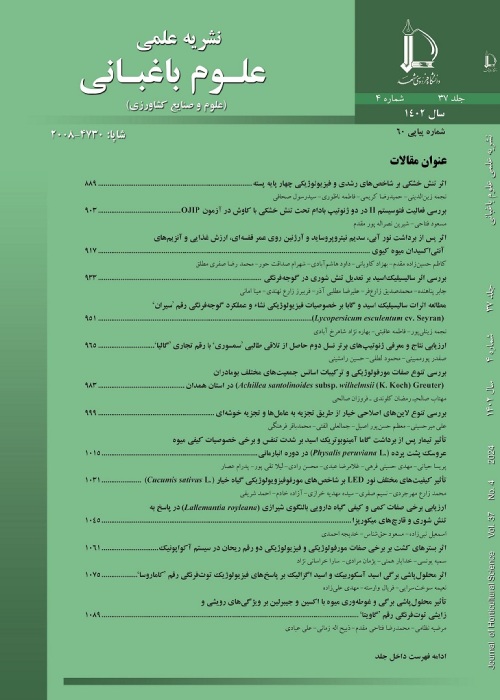Effect of Salicylic acid Application on Morphophysiological Traits of Physalis peruviana L. under Deficit Water Stress
Reduction of water available to the plant leads to many morphological, physiological and biochemical changes in plant cell and plant organs activity will be directly disrupted. In addition to the defense systems in the plant itself, there are other ways to increase plant resistance, including the use of plant growth regulators. Salicylic acid is known as one of the common compounds used for environmental stresses and an essential molecular signal in plant fluctuations in response to environmental stresses. This substance has a protective effect and improves the growth process of the plant. This combination stimulates the plant immune system by inducing transcription of a specific group of genes involved in the defense and development of systemic resistance. Physalis is a small fruit of the Solanaceae family that originates in tropical and subtropical regions of South America. This genus has 80 species in the world, of which the famous species Ph. minima L., Ph. angulate L., Ph. philadelphia L., Ph. alkekengi L., Ph. peruviana L., Ph. pubscens L., Ph. ixocarpa L., among these species, Peruviana species is considered due to its unique taste and high yield.
An experiment was conducted at the Faculty of Agriculture research greenhouse of Lorestan University Khorramabad, Iran. (latitude 33◦ 29` N, longitude 48◦ 22` E, altitude 1125 m) in May 2018. The experimental design was factorial based on completely randomized design with three replications. The treatments consisted of 3 levels of deficit water stress (95, 85, and 75% field capacity) and four salicylic acid concentrations (0, 0.5, 1, and 2 mM). Physalis seedlings were grown into pots containing soil, sand, and manure. In this research, chlorophyll (Chl a, Chl b, total Chl) and carotenoid content, chlorophyll fluorescent parameters (F0, Fm, Fv, and Fv/Fm), fresh and dry weight of fruit, fruit diameter, fruit number, TSS and vitamin C, proline, leaf anthocyanin and shoot soluble sugar, fresh and dry weight of leaf, leaf area, root volume and plant height, were measured.
The results showed that the effect of deficit water stress and salicylic acid treatment on the measured traits including photosynthetic pigments, chlorophyll fluorescence, fresh, and dry weight of fruit, number of fruits, amount of vitamin C, proline, soluble sugar, fresh and dry weight of leaves, leaf area, plant height and root volume were significant. Foliar application of salicylic acid at a concentration of 2 mM under water stress under 75% of field capacity increases the concentration of photosynthetic pigments including chlorophyll a (25.69%), chlorophyll b (14.08%), total chlorophyll (6.70%), and carotenoid (7.26%) and increased chlorophyll fluorescence parameters including Fm (5.2%) and Fv (1.92%). Salicylic acid at a concentration of 1 mM had better results on quantitative and qualitative traits of fruit including a number of fruits (2.67%), fresh weight of fruit (10.61%), and dry weight of fruit (0.6%). Under stress conditions of 75% of field capacity, application of 2 mM salicylic acid reduced the concentration of proline (31.2%), soluble sugar (11.69%) and leaf anthocyanin (4.93%). Therefore, according to the results, the best levels of irrigation for breeding Physalis (Physalis pruviana L.) are 85 and 95% of field capacity, and the concentration of 2 mM salicylic acid as a natural modulator has an effective role in reducing the effects of dehydration stress. Stress significantly reduces the maximum efficiency of photosystem II (Fv/Fm). This adverse effect on Fv/Fm may be due to its role in inhibiting electron transfer, as well as destroying the reaction centers in PSII. Accumulation of proline under stress is because proline, as a compatible osmolyte, removes all types of active oxygen and protects the cell, and provides the necessary conditions for the plant to absorb water. Salicylic acid increases the chlorophyll synthesis and protects the chloroplast membrane from stress by removing destructive free radicals by stimulating the biosynthetic of the photosynthetic pigment pathway and reducing the chlorophyllas enzyme. It also prevents the ethylene formation by inhibiting of ACC- synthetase enzyme, which in turn prevents the degradation of chlorophyll. Salicylic acid regulates the various physiological processes such as plant growth and development.
According to the results, the application of salicylic acid under low irrigation stress, as a growth enhancer and stress modulator, showed good results and improved physiological traits such as increasing photosynthetic pigments (chlorophyll and carotenoids), Fm, Fv and maximum efficiency of photosystem II and improvement of biochemical traits (proline, soluble sugar and leaf anthocyanin) at a concentration of 2 mM and increase in fruit traits (fresh and dry weight, number of fruits, vitamin C and fruit diameter) at a concentration of 1 mM. Growth and morphological traits also showed an increase in fresh and dry leaf weight, leaf area, plant height at a concentration of 2 mM salicylic acid at low irrigation stress levels. Therefore, salicylic acid can be used to reduce the destructive effects of deficit water stress and increase the quantity and quality of fruit if the Physalis plant is grown in arid and semi-arid regions.
- حق عضویت دریافتی صرف حمایت از نشریات عضو و نگهداری، تکمیل و توسعه مگیران میشود.
- پرداخت حق اشتراک و دانلود مقالات اجازه بازنشر آن در سایر رسانههای چاپی و دیجیتال را به کاربر نمیدهد.



